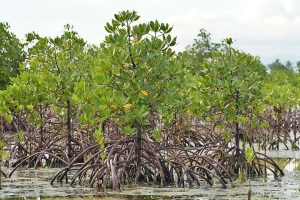Ocean economy seen needing stronger environmental protections

THE GOVERNMENT needs to strengthen its environmental laws and turn to nature-based solutions if it wants to harness the potential of its blue economy, according to an environmental advocacy group.
Philippine blue-economy ambitions “must be anchored on good ocean governance, strong environmental laws, nature-based solutions, and community stewardship,” Oceana said in an e-mail.
It flagged the destruction of mangroves, wetlands, and reefs as especially harmful in an archipelagic country.
Among the most urgent moves needed to protect ocean resources is the signing into law of the bill declaring Panaon Island south of Leyte as a protected seascape under the Expanded National Integrated Protected Areas System (E-NIPAS) Act.
The bill has been passed by both Houses of Congress.
“Panaon Island is home to some of the country’s most pristine coral reefs and supports thousands of Filipinos through fishing and ecotourism.
“This legislation is the product of years of scientific research, stakeholder consultations, and community support,” Oceana said.
“Its signing will preserve marine biodiversity, enhance food security, and empower communities to manage their seas sustainably,” it added.
The group also urged the government to include the proposed National Coastal Greenbelt Act in the Legislative Executive Development Advisory Council agenda.
“These two landmark measures are seen as key steps in safeguarding the country’s marine biodiversity, improving climate resilience, and securing local livelihoods,” Oceana said.
The national coastal greenbelt proposal proposes the establishment of a nationwide network of mangroves and beach forests as natural buffers against coastal erosion, storm surges, and sea level rise.
“This bill provides a strategic and science-based approach to mitigate the devastating impacts of climate change, especially in vulnerable coastal area,” Oceana said.
It also called on the government to uphold the protection of the Las Piñas–Parañaque Wetland Park (LPPWP), Metro Manila’s last remaining mangrove forest.
LPPWP had been declared a protected area under the E-NIPAS Act of 2018 and has been included in the Ramsar List of Wetlands of International Importance.
Oceana said the government should also ensure transparency and meaningful consultation in all marine development activities.
Nearly 80% of Philippine territory consists of waters, according to the Philippine Institute for Development Studies.
The ocean economy grew 9.9% to P943.05 billion in 2023, according to government data. — Kyle Aristophere T. Atienza




